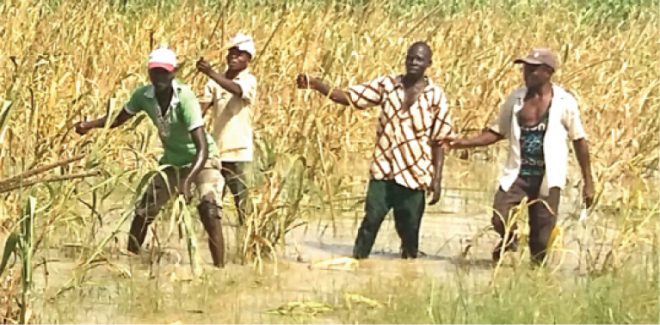Harvest threatened as floods wash away thousands of farmlands
Ringim Local Government Area of Jigawa State is likely to experience food deficit this harvest season, following the flood that washed away thousands of farmlands in the area. Rice, cow pea, sorghum, millet, sesame and tomato farms belonging to over 46,000 people majority of whom are small holder farmers along River Hadejia were submerged. The […]

File photo: Farmers harvest pre-matual millet from a flooded farm in the affected areas.
Ringim Local Government Area of Jigawa State is likely to experience food deficit this harvest season, following the flood that washed away thousands of farmlands in the area.
Rice, cow pea, sorghum, millet, sesame and tomato farms belonging to over 46,000 people majority of whom are small holder farmers along River Hadejia were submerged.
The river, which has its source from Tiga and Challawa dams in Kano State, reportedly overflowed its banks, flooding farm lands and houses along the way.
Our correspondent reports that the flood wreaked havoc in six out of the 10 political wards of the local government area. All crops in the affected farms were said to have been damaged with the exception of millet which the farmers rushed to harvest prematurely.
In Dabi village, which is worse hit by the flood, over 5000 hectares of farmland was said to have been destroyed by the disaster, while in Kaura village, over 100 hectares of tomato and garden egg were destroyed.
When Daily Trust visited Dabi village which has been cut off from the main road, most of the farms have virtually disappeared under flood waters.
Speaking to Daily Trust, the council chairman, Alhaji Abdulrashid Illah Ibrahim, said his council was worried it is not likely to witness the usual bumper harvest this year because about 70 percent of the farms have been destroyed by flood.
He recalled that the last time Ringim LGA experienced such a disaster was in 2003, and that it led to the relocation of some communities to highland areas.
The council chairman noted that the areas affected by the flood were the most fertile part of the council.
He, however, said once the flood receded, the farmers could go back to their farmlands for re-cropping as they traditionally produced thrice in a year.
According to him, over 50,000 farmlands were destroyed in the disaster, and most of the cash crops which included rice, cowpea, sesame, hibiscus and tomato were completely washed away.
“The local government area will experience a shortage in terms of what it will produce by about 70 percent this year’s harvesting season as a result of the flood. It is scaring for such huge volume of food to be lost in a single harvest season.
“All farmlands along the bank of River Hadejia were destroyed. The most disturbing aspect of the whole matter is the volume of the flooding water, which is increasing by the day. If it continues unabated, the havoc will not be limited to what we are talking about now.
“Communities in six out of the 10 political wards that make of the local government area are affected. Over 46,000 farmers have been affected by the disaster. The flood which is a result of over flooding of River Hadejia, which has its source from Tiga and Challawa dams in neighbouring Kano State destroyed over 50,000 farmlands in the Ringim LGA,” he said.
The chairman of tomatoes association and garden eggs farmers in Kaura village, Ahmadu Markalle, said over 100 hectares of tomato and garden eggs plants were destroyed by the flood in Kaura, adding that the farms were washed away in a way they never experienced in the areas.
He explained also that he has five hectares of farmlands located in different places from which, he said, at harvest period he usually realised N500,000 to N700,000.
He said, that with the development, unless there is intervention interms of either farm inputs or cash relief that will enable farmers to go back to farms, many will be out of business this year.
“About 80 percent of tomatoes and garden eggs production is affected. This suggests that there will be acute shortage of the stuff this year. About 100 hectares of tomatoes and garden eggs farms have been washed away while about 90 farmers lost their farmlands to the flood in Kaura. There will be shortage of these commodities this year, unless there is intervention.”
Also speaking to Daily Trust, the Ringim Local Government Area chairman of All Farmers Association of Nigerians (AFAN), said this year promised to be the best farming season with high hope of bumper harvest in the LGA, considering the support enjoyed by farmers from both state and federal governments.
He however lamented that the hope has been dashed following the flood.
He stated that in Dabi village alone, which was most hit by the disaster, over 5,000 farmlands belonging to over 500 farmers were washed away by the flood, adding that the destruction affected about 90 percent of what was expected to be harvested in this year.
